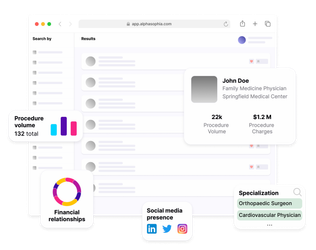AI in Healthcare: Key Innovations and 5 Companies to Watch in 2025

Artificial intelligence is everywhere in 2024, changing industries and driving new ideas. Tools like ChatGPT are making content creation easier, while Google Health’s AI is improving how we read medical images. Tesla is advancing self-driving cars, and platforms like MidJourney are bringing new creativity to art and design.
While much of the buzz has focused on consumer tech, some of the most transformative applications of AI are happening in healthcare. From streamlining operations to improving patient outcomes, AI is changing how we approach medical care at every level. But what exactly does AI in healthcare look like, and why is it considered one of the most promising frontiers in medicine?
What is Healthcare AI?
Imagine a world where your doctor can predict a potential health issue before symptoms even appear or where surgeries are planned with insights derived from millions of successful procedures. That’s the promise of Healthcare AI.
At its core, Healthcare AI leverages cutting-edge technologies like machine learning, natural language processing (NLP), and predictive analytics to solve some of the most complex challenges in medicine. These tools sift through massive amounts of data to uncover patterns, automate tasks, and support healthcare providers in making smarter, faster decisions.
For example, AI can help identify tumors on medical images more accurately than traditional methods or assist hospitals in forecasting patient surges to optimize staffing.
Benefits of Healthcare AI
- Improved Diagnostics: AI-powered tools analyze medical images and patient data with remarkable precision, reducing diagnostic errors and enabling earlier disease detection. For instance, studies show that AI can detect certain cancers with up to 17% greater accuracy than traditional methods.
- Operational Efficiency: AI automates repetitive tasks like scheduling and billing, saving time for healthcare providers. The Maidstone and Tunbridge Wells Trust in the UK adopted TeleTracking’s software to streamline patient flow. Using electronic wristbands and a central control room, they achieved real-time tracking of patients, reducing waiting times and improving overall efficiency.
- Personalized Patient Care: By analyzing patient histories, genetic information, and real-time health metrics, AI helps develop tailored treatment plans, improving patient outcomes.
And More…
AI in healthcare also enhances real-time patient monitoring through wearable devices, accelerates drug discovery, and even supports telemedicine by improving virtual care platforms. These advancements are shaping a smarter, faster, and more efficient healthcare ecosystem.
Challenges and Ethical Considerations
Implementing AI in healthcare offers transformative potential but also presents significant challenges and ethical considerations:
- Data Privacy and Security: AI systems require vast amounts of patient data, raising concerns about confidentiality and the risk of breaches. Ensuring compliance with regulations like GDPR is essential to maintain trust.
- Algorithm Bias: AI models trained on non-representative datasets can perpetuate existing healthcare disparities, leading to unequal treatment outcomes. Addressing this requires diverse and comprehensive data collection.
- Transparency and Explainability: Many AI algorithms operate as “black boxes”, making it difficult for healthcare professionals to understand their decision-making processes. This lack of transparency can hinder trust and acceptance among practitioners.
- Regulatory Compliance: The rapid evolution of AI technologies often outpaces existing healthcare regulations, creating challenges in ensuring that AI applications meet safety and efficacy standards.
- Accountability and Liability: Determining responsibility when AI systems err is complex. Clear guidelines are needed to assign accountability among developers, healthcare providers, and institutions.
- Driving Adoption: Adoption is critical for the success of advanced AI tools. Engaging early adopters, such as Key Opinion Leaders (KOLs) and progressive healthcare institutions, is essential to building trust and proving value. Without a strategic approach, even the most innovative AI solutions can face challenges in gaining momentum.
5 AI Companies to Watch in Healthcare for 2025
-
Cleerly
Cleerly is transforming cardiovascular care with its advanced AI-driven imaging solutions. By enabling the early detection and precise diagnosis of heart disease, Cleerly focuses on predictive and preventive care to reduce the global burden of cardiovascular conditions. Their innovative technology is shaping a new era in heart health management. -
Qure.ai
Qure.ai specializes in medical imaging, leveraging artificial intelligence to interpret radiology scans with speed and accuracy. Its technology has been instrumental in the early detection of diseases like tuberculosis, COVID-19, and brain injuries. With deployments in over 50 countries, Qure.ai is making a significant global impact on diagnostics and healthcare accessibility. -
Owkin
Owkin is a trailblazer in AI-powered medical research, bridging the gap between data science and drug development. By collaborating with pharmaceutical giants like Sanofi and Bristol-Myers Squibb, Owkin uses machine learning to uncover novel insights in oncology, immunology, and rare diseases. This French-American startup is reshaping how data informs pharmaceutical innovation. -
Vitazi.ai
Vitazi.ai is revolutionizing preventive healthcare through its focus on oculomics—using AI to analyze retinal data for early disease detection. By integrating AI and teleretinal tools, Vitazi.ai enables point-of-care health screenings that intercept diseases at their earliest stages. This cutting-edge approach transforms routine eye exams into life-saving diagnostics. -
Exscientia
Exscientia is leading the charge in AI-driven drug discovery, accelerating the creation of new therapies with deep learning and advanced biological modeling. By identifying promising drug candidates faster than traditional methods, Exscientia has attracted high-profile partnerships and funding. Its innovative process is redefining the future of pharmaceutical development.
Is Healthcare Ready for AI?
AI is reshaping the future of healthcare, but adoption doesn’t happen overnight. While some are ready to embrace cutting-edge technologies, others take a cautious approach. The key is knowing where to start—identifying early adopters and key influencers who can drive momentum for your innovation. Tools like Alpha Sophia can help you navigate this challenge by identifying Key Opinion Leaders (KOLs), understanding behavioral trends, and segmenting audiences effectively. It’s about more than just reaching the market. It’s about connecting with those who will champion and accelerate the adoption of your innovation.
As healthcare evolves, success lies in not just having the technology but in knowing how to introduce it to the right people.
Accelerate AI Adoption Today

